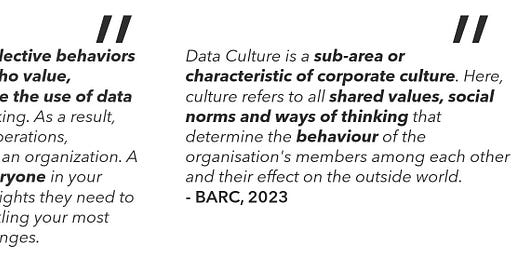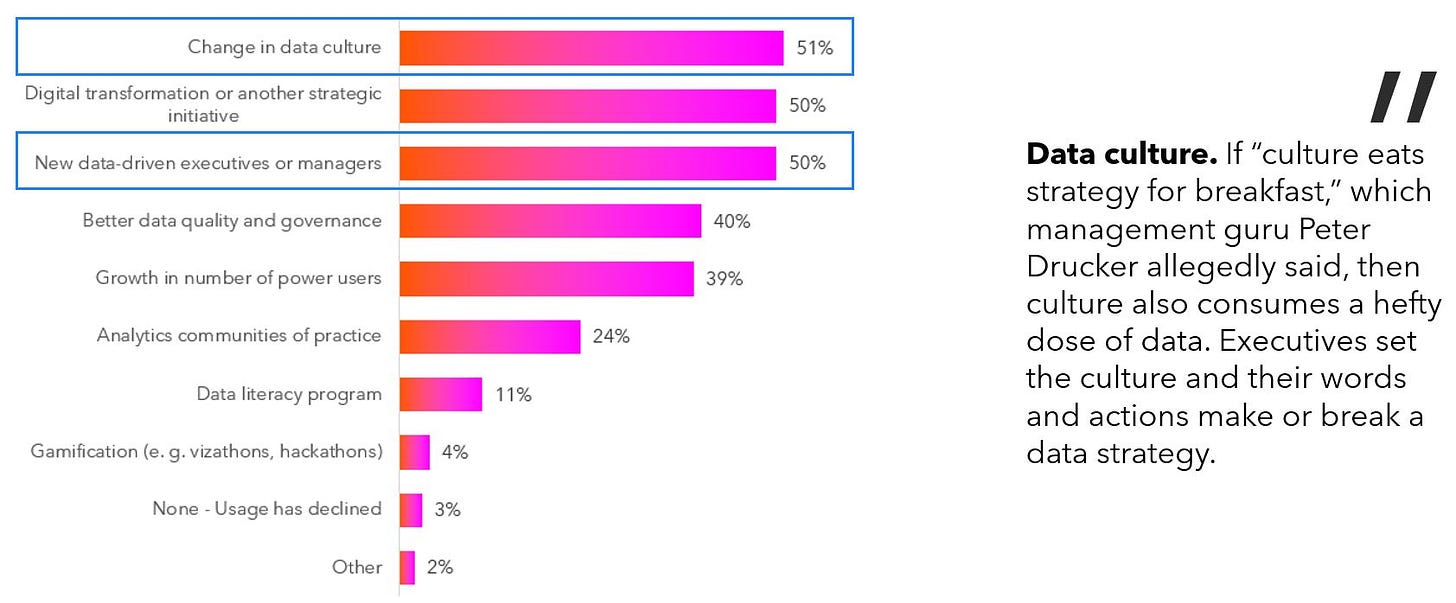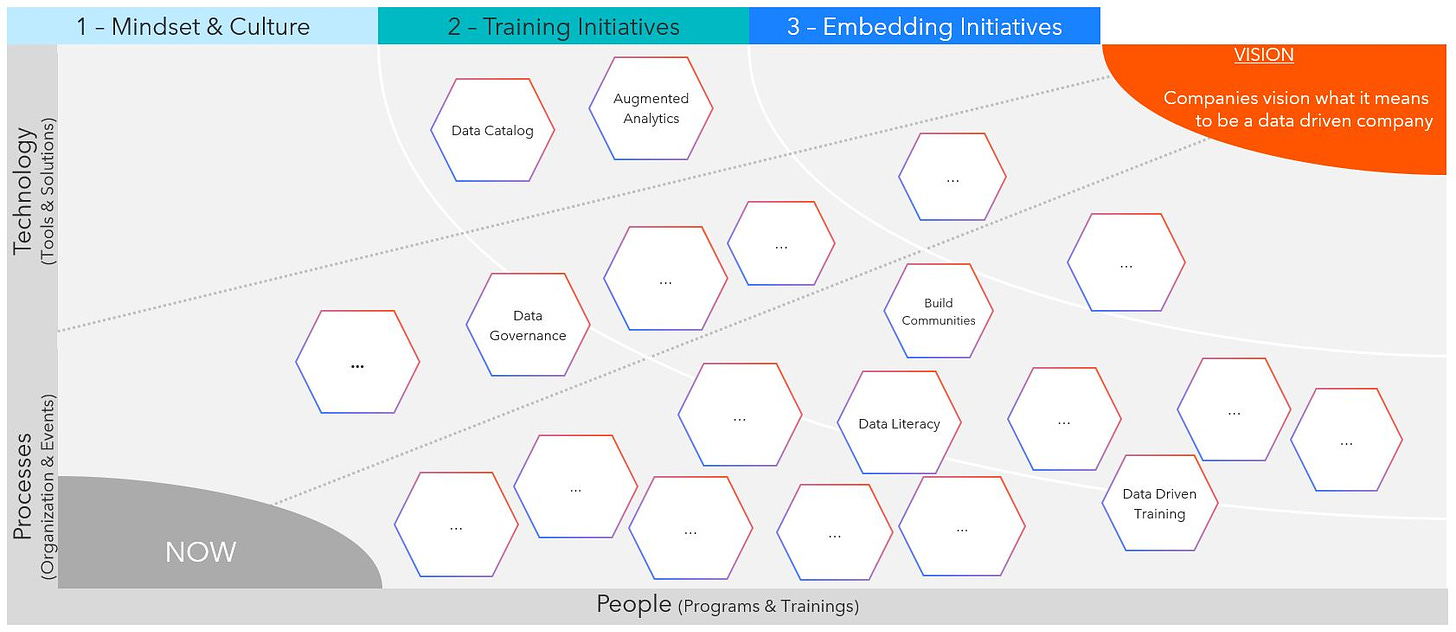Make your Data Strategy work - with the right Data Culture initiative
From Data Leadership to a Vision for Data and your individual Roadmap
Some time ago I have written about Data Literacy which describes the skills and capabilities of peope within a company to create value from data. Working with companies on data strategy projects on topics like data architecture, data governance, target operation model and so on, shows that a healthy and active Data Culture is a fundamental capability for an organization to be successfull with these activities and making the data strategy work.
I will give two definitions I found for Data Culture. They are similar, but both have interesting aspects worth mentioning:
Fig. 1: Market definitions of Data Culture | Source BARC (german) / Source Tableau
As we can see Data Culture is easy to describe, but hard to measure. Ultimately you see results in the quality of work and the amount of new ideas how to create value from data and enhance your business model in a data-driven way. Data Culture may be hard to measure, but it is extremely important for any investment a company makes in data & analytics. Being with a customer I see the state of Data Culture mainly in the collaboration with the business departments, less so with IT or digitization departments.
A recent study from BARC and Eckerson Group shows, that Data Culture is one of the most important drivers for a successful adoption of BI and Analytics in an organization, and that executives and managers are the most important drivers for developing the right Data Culture in your organization:
Fig. 2: Source: “Strategies for Driving Adoption and Value with BI and Analytics”, BARC and Eckerson Group, 2022 - Question "Which business drivers have contributed to an increase in usage and adoption of BI/Analytics tools?"
Therefore, data leadership should be an important part of fostering Data Culture and Data Literacy in a company to create maximum value from data. My company describe data leadership as "Leadership by example, establishing end-to-end decision-making based on data and leading the data measures.". Typically I see two directions for data leadership:
Fig. 3: Push and Pull activities for data leaders
There is a nice example from SAP on how they made steps in 2013 and accelerated Data Culture by "simply" handing mangers and employees an iPad, which shows how push and pull could work via the following success factors:
Bringing information and people closer together
Executive support
The investment in expertise and support behind the technology
I would like to quote a very important sentence from the related blog by Laura Jamieson of SAP - " In an information culture, data is used alongside experience and intuition in decision making. Employees build and tell fact-based stories." - It is so important to realize with all the love for data and technology that data is important and helpful, but we should not become obsessed with data as the human factor is still very important in making the right decisions.
Often Data & Analytics is all about technology in the first place. We now know that data leadership, the right data strategy and data literacy are some of the key factors do make Data & Analytics work. So what are approaches and possibilities data teams to advance Data Culture?
Data Strategy - Understand Data & Anayltics as an holistic approach where everything meshes together. E. g. SAP offers a masterclass on data strategy which could be a good start to learn what is important and how to get started. Otherwise developing data strategy is part of my daily business.
Augmented Analytics and LLM-driven assistents - Many BI vendors augment classical BI with ML to accelerate analytics and the understanding of data. Current developments with Large Language Models (see ChatGPT) bring in new aspects and bridge the gap to the user if done right. Is can lower the barriers for advanced and complex data analytics and can accelerate use of data. Let your people know about and train them where necessary.
Data Catalog - For me, currently a key enabler for data democratication and data literacy. Data Catalogs are on the rise. There are offerings on the market that help to make data catalog a holistic experience that provides visibility across all data assets in the organization. Remember, though, that a tool is a tool, and a catalog can be a bad investment if you're not prepared to tie it to a data governance initiative and base it on clear use cases.
Data Democratization - while a data catalog can be very helpful for the process of data democratization, it is only one step. It is very important to simplify access to data, but there needs to be a balance between self-service initiatives, data literacy, and data governance to make this work for you.
Data Governance - Getting data quality right, master data management, establish data ownership and rules supporting people in your organization and providing guidance how your organization want to work with data via data principles is something where - if you do it right - you can actively influence the right Data Culture. My colleague Bernd Heßbrügge recently wrote a helpful article about, which I recommend here.
Data Literacy - Typically with customers my company starts with a "Data School" module building tool-independed skills like data visualization, self service BI & data preparation but also training for specific BI and analytics tools, as well as data ethics and data driven innovations should be introduced as trainings and offered for managers and the employees on a recurring basis to empower them, as data is now a topic for almost everyone in the organization.
Organizations are easily overwhelmed when trying to move to a data driven mindset and active Data Culture. Depending on where you come from, it might be a good idea to work with phases and break down your activities, responsibilities and expected impacts or outcomes. This can be very individual but let me give an example for structuring possible phases to illustrate:
Fig. 4: Phases for Data Culture initiatives
So, as we can see, it is not primarily about technology, but about people, even if the right use of technology is right there and technical skills are equally important. But often technology is already there today, but is not used in a way that adds much value, or people lack the skills, missing access to existing tools or data. Additionally you need the right leadership and organizational frame.
First check if the right mindset is alread in place, or start here before setting up trainings for tools and skills not required by management and business.
Training and organizational guidelines becomes core, along with knowledge-sharing opportunities within the organization and external stimulus.
Finally embedd data use and learning around data into daily activities and make it the new normal on your way to a data driven organization.
Two hints for possible next steps:
We do talks and events around Data Culture and other topics. Have a look at our Innovation Day 2022 and the presentation on Data Culture: "Datenkultur – Lösungsansätze, Hindernisse und Werkzeugkoffer" (german only)
Furthermore we offer consulting to make the next step in Data Culture for your company.
This article was originally published in the SAP Community and adapted slightly to current development an a more general, tool-independent understanding.






